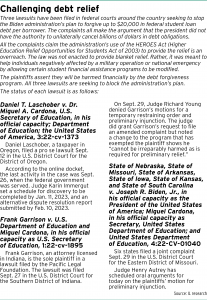Subscriber Benefit
As a subscriber you can listen to articles at work, in the car, or while you work out. Subscribe NowThe law school professor seemed to shrug when talking about the optics.

“The legal profession already has a pretty bad reputation, some for good reasons, some for bad reasons,” said Ilya Somin, professor at George Mason University Antonin Scalia Law School. “I highly doubt this case will have a big impact on the reputation of the legal profession either way.”
The case is the lawsuit filed by Indiana attorney Frank Garrison, who is trying to block the Biden administration’s student loan debt relief program. And while the legal action may do little to improve or weaken the reputation of lawyers, it also will likely have little impact on the program itself.
Garrison claims that despite being eligible for $20,000 in debt forgiveness, he would be harmed because the state of Indiana would consider the relief amount income and tax him $1,000. However, in a court filing, the Department of Education clarified borrowers who qualify for automatic debt relief, including Garrison, can opt out of the program.
Judge Richard Young of the Indiana Southern District Court is allowing the plaintiff to file an amended complaint even as he suggested Garrison consider key issues raised in a scheduling conference — namely, whether Garrison will have standing and if the case is ripe for adjudication because the program is still evolving.
If Garrison’s case is dismissed, two others are still active in the federal courts and more are expected to be filed. Moreover, the burden and controversy of student loan debt relief will not quickly subside.
Young lawyers have been especially vocal about the need for help. A 2020 survey by the American Bar Association Young Lawyer Division found more than 75% of the respondents had at least $100,000 in student loans at graduation, while more than half had loan debt that exceeded $150,000.

Charlyn Stanberry, a 2013 graduate of Florida International University College of Law, is the author of an ABA resolution advocating for the cancellation of at least $50,000 of debt for all student loan borrowers. The Young Lawyers Division passed the resolution in August.
Speaking as a young attorney and not on behalf of the YLD, Stanberry said forgiving student debt will enable more law school graduates to participate in the economy. They would not have to delay reaching the traditional milestones of adulthood like homeownership and marriage, she said.
Also, Stanberry questioned whether new J.D. graduates would have enough time in the workforce to pay off their debt.
“Are people really going to have that much longer to pay off all of this debt and still (realize) the American dream of having the house, the car, the kids, saving up for your children’s college tuition?” Stanberry said. “Another factor they don’t think about is the generational aspects. Baby boomers are retiring, so now, I may have to take care of my parent in addition to providing for my family.”
Somin faults not only the Biden relief plan but also the idea of forgiving student loans. He acknowledged as a law professor that “subsidizing the purchase” of legal education is in his best interest, but he said he believes debt cancellation harms the country as a whole.
 “I am opposed to student loan debt relief on this kind of massive scale because it includes all sorts of people who are actually doing much better (financially) than the national average and actually burdens taxpayers, many of whom are poorer than them,” Somin said. “It has a perverse effect also on higher education costs and encourages people in my industry to raise our prices and be less efficient about our expenditures.”
“I am opposed to student loan debt relief on this kind of massive scale because it includes all sorts of people who are actually doing much better (financially) than the national average and actually burdens taxpayers, many of whom are poorer than them,” Somin said. “It has a perverse effect also on higher education costs and encourages people in my industry to raise our prices and be less efficient about our expenditures.”
Debt and overreach
According to data from Law School Transparency, graduates of Indiana’s law schools could have six-figure student loan debt by the time they receive their J.D. degree. Calculating the debt for in-state residents who receive a 25% discount on tuition and spend 10% less than the maximum cost of living amount, LST made the following estimates of debt and payments on a 20-year plan:
- Indiana University Maurer School of Law graduates owe 170,522 and pay $1,210 a month.
- Indiana University Robert H. McKinney School of Law graduates owe $147,233 and pay $1,039 a month.
- Notre Dame Law School graduates owe $239,623 and pay $1,715 a month.
Overall, the Congressional Budget Office has estimated the debt forgiveness program will cost $400 billion.
Garrison, who relied on student loans and Pell Grants to finance his college education, lives in Indiana and practices environmental law at the Pacific Legal Foundation. The foundation is representing Garrison in his challenge to the Biden program, Garrison v. U.S. Department of Education, et al., 1:22-cv-1895.
Additionally, Somin clarified that his wife also works for the Pacific Legal Foundation, and he had informal conversations with the foundation, urging them to consider litigation. Yet, he emphasized his interest and opposition to the debt relief initiative predates Garrison filing his lawsuit.
The Biden administration is claiming it has the power under the Higher Education Relief Opportunities for Students Act of 2003, or HEROES Act, to cancel student debt. Garrison and the six states who recently filed a separate lawsuit opposing the program — State of Nebraska, et al., v. Joseph R. Biden, Jr., et al., 4:22-cv-01040 — argue the president is overstepping his authority.
Somin agreed with the plaintiffs that the executive branch is overreaching and is violating the Constitution’s separation of powers. As the plaintiffs argue, only Congress holds the nation’s checkbook.
“The litigation is not ultimately over, ‘Is this a good idea?’ It’s litigation about, ‘Does the president have the authority to do this?’” Somin said, noting he had the same objections when President Donald Trump tried to divert money from the military to pay for the southern border wall. “Even if you believe that this is a good idea, you should be concerned about the precedent that is set when presidents use emergency power to get around Congress’ control over the power of the purse.”
Yet, to make those arguments in court, the plaintiffs must overcome the standing hurdle. Somin, foreshadowing Judge Young’s concern, said the opt-out provision could remove the harm that gives Garrison standing.
Stanberry said she expected lawsuits would be filed to try to stop the debt relief. She said she is confident the White House thoroughly vetted the legal grounds for launching the program.
“This is a good plan,” Stanberry said of the Biden program. “This is something that’s going to have significant impact on a lot of individuals. So I think that that outweighs people thinking it may be an overreach.”•
Please enable JavaScript to view this content.
